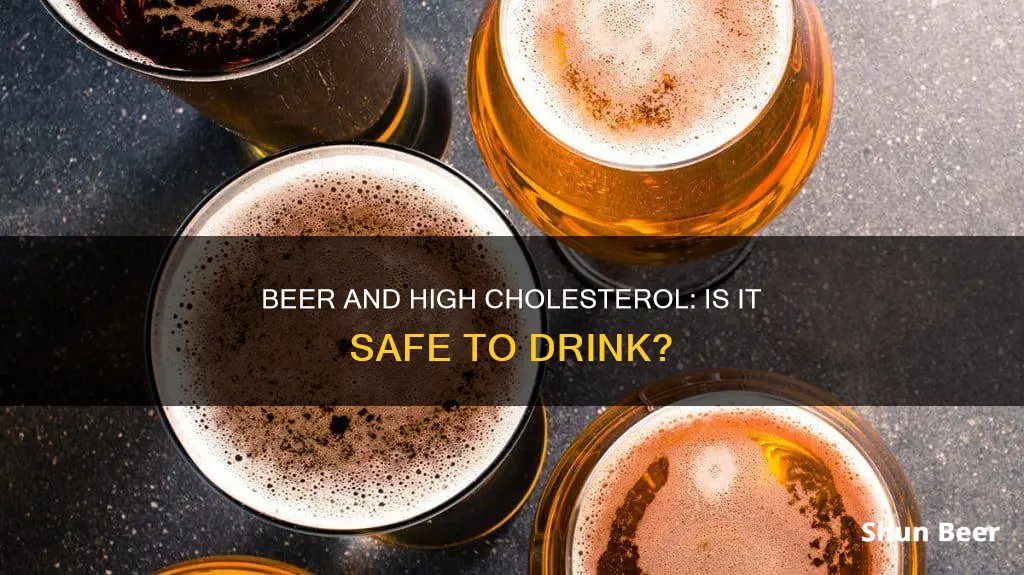
Beer is a popular alcoholic beverage, but its impact on cholesterol levels has been the subject of much debate. While beer itself does not contain natural cholesterol, it can still influence cholesterol levels in the body. Beer contains carbohydrates and alcohol, which are known to raise triglyceride levels. Triglycerides are a type of fat that contribute to total cholesterol levels, along with HDL and LDL cholesterol. Research suggests that moderate beer consumption may increase good HDL cholesterol levels, but it does not lower bad LDL cholesterol, which is responsible for arterial blockage. The relationship between alcohol and cholesterol is complex, and excessive drinking can lead to higher total cholesterol and an increased risk of heart disease. Therefore, it is essential to drink in moderation and consult a healthcare professional for personalized advice regarding alcohol consumption and cholesterol management.
| Characteristics | Values |
|---|---|
| Beer contains cholesterol | Beer does not contain natural cholesterol, but it can raise triglyceride levels. |
| Beer and cholesterol | Beer may increase levels of "good" cholesterol (HDL) in the blood, but it does not lower "bad" cholesterol (LDL). |
| Beer and heart health | Drinking beer in moderation may have a positive impact on heart health, but heavy drinking increases the risk of heart disease. |
| Recommendations | It is recommended that men drink no more than two drinks per day and women drink no more than one drink per day. |
What You'll Learn

Beer can raise your triglyceride levels
Beer is a popular alcoholic beverage, and it's no surprise that many people enjoy a cold brew. However, it's important to be aware of how beer can impact your health, especially if you have high cholesterol.
When it comes to cholesterol, there are two types: HDL (good cholesterol) and LDL (bad cholesterol). Triglycerides, a type of fat, are often included in the discussion about cholesterol. That's because they are a part of the total cholesterol count in your body. Ideally, your triglyceride level should be below 150 milligrams per deciliter (mg/dL).
Beer, unfortunately, can cause your triglyceride levels to rise. This is because beer contains carbohydrates and alcohol, both of which quickly increase triglyceride levels. The effect can be even more pronounced in people who are more sensitive to the effects of beer. As a result, drinking beer can lead to an increase in your total cholesterol levels, which is not ideal for maintaining a healthy heart.
It's worth noting that some studies have suggested that moderate beer consumption may offer some health benefits. For example, it may increase levels of HDL ("good" cholesterol) and reduce the risk of coronary artery disease. However, these potential benefits do not outweigh the risks associated with alcohol consumption, especially heavy drinking, which can lead to high blood pressure, heart disease, stroke, liver disease, and an increased risk of certain cancers.
If you're concerned about your cholesterol levels or the impact of alcohol on your health, it's always best to consult with your doctor. They can provide personalized advice and recommendations based on your individual needs and circumstances.
Jehovah's Witnesses and Alcohol: Beer Included?
You may want to see also

Beer doesn't contain any natural cholesterol
It's important to note that beer does not contain any natural cholesterol. However, this does not mean that drinking beer will have no impact on your cholesterol levels. Beer contains carbohydrates and alcohol, which are substances that can quickly raise triglyceride levels. Since triglycerides are part of the total cholesterol count, an increase in triglycerides will lead to an increase in total cholesterol. Ideally, your triglyceride level should be below 150 milligrams per decilitre (mg/dL).
Beer also contains cholesterol-binding sterols, such as sitosterol and ergosterol, which are plant compounds that help remove cholesterol from your body. However, these sterols are present in very low levels in beer, so they are not effective in reducing cholesterol.
While moderate beer consumption may offer some health benefits, such as a reduced risk of heart disease, it is important to note that excessive alcohol consumption can have negative impacts on your health. It can increase your risk of heart disease, stroke, high blood pressure, liver disease, and certain types of cancer. Therefore, it is crucial to drink in moderation and consult with your doctor to determine if drinking beer is safe for you.
To effectively manage your cholesterol levels, it is recommended to focus on lifestyle factors such as regular exercise and a healthy diet that is low in simple sugars and alcohol.
Beer Overload: Diarrhea and Dehydration Risks
You may want to see also

Beer may increase levels of good cholesterol
Beer is one of the most popular alcoholic beverages worldwide. While beer is mostly composed of water, it is rich in nutrients such as carbohydrates, amino acids, minerals, vitamins, and plant-based compounds known as polyphenols.
The Good
Beer may increase levels of "good" cholesterol, also known as high-density lipoprotein (HDL). HDL traps and carries "bad" cholesterol, or low-density lipoprotein (LDL), to the liver to be broken down and eliminated. By increasing "good" cholesterol levels, there may be less "bad" cholesterol that can stick to the walls of arteries and cause coronary artery disease (CAD).
A 2018 study published in Nutrients found that the moderate consumption of beer in overweight adults (30 grams of alcohol per day for males and 15 grams per day for females) increased HDL levels after four weeks. Consuming beer in this amount did not significantly alter liver function or contribute to the stiffening of arteries, a contributing risk factor for high blood pressure and CAD.
A 2020 review of studies in PLoS One confirmed these findings, concluding that the low to moderate consumption of beer increases HDL levels but has no tangible effect on either LDL or triglycerides. The same study also suggested that beer may increase the flexibility of blood vessels, thereby reducing blood pressure and the risk of CAD.
The Bad
Beer largely falls into the same category as spirits when it comes to alcohol consumption and its effects on health. The consumption of alcohol in any form has health implications, and few health experts would ever regard beer as "healthy" or advise a non-drinker to consume it for health reasons.
Beer contains cholesterol-binding sterols, specifically sitosterol or ergosterol, but these are at such low levels that even a whole-grain beer contains too little of them to have a significant impact on reducing cholesterol. Beer also contains carbohydrates and alcohol, two substances that raise triglycerides quickly. Since triglycerides are part of the total cholesterol count, an increase in triglycerides means an increase in total cholesterol.
The Bottom Line
The risks of drinking alcohol far outweigh any potential benefits. The World Health Organization states that "no level of alcohol is safe for our health" and that the potential harms "start from the first drop of alcohol you consume." Alcohol has also been classified as a Group 1 carcinogen by the International Agency for Research on Cancer (IARC).
If you choose to drink beer, the key is to drink in moderation: no more than two beers a day for males and one beer a day for females. If you don't drink alcohol, do not start under the presumption that it will improve your heart health.
Johnny Depp's Relationship with Beer: A Curious Insight
You may want to see also

Excessive drinking can lead to heart disease
Alcohol can also cause weight gain and obesity, which can further increase the risk of heart disease. Obesity is associated with a long list of health problems, including high blood pressure, high cholesterol, and diabetes. These conditions can all contribute to heart disease.
Excessive drinking can also lead to an inactive lifestyle, which can increase the risk of heart disease. Physical activity helps to keep the heart healthy and reduces the risk of heart-related problems. However, when a person consumes too much alcohol, they may become less physically active, which can have negative effects on their heart health.
In addition, excessive drinking can lead to alcoholism, which can have devastating effects on a person's health, including their heart health. Alcoholism can cause changes in the heart's structure and function, leading to conditions such as cardiomyopathy and arrhythmia.
Overall, excessive drinking is a major risk factor for heart disease. It can lead to high blood pressure, obesity, and an inactive lifestyle, all of which can increase the risk of heart-related problems. It can also contribute to alcoholism, which can have direct negative effects on the heart. Therefore, it is important to drink in moderation and to prioritize other heart-healthy behaviors, such as regular exercise and a healthy diet.
Beer Drinking: When to Stop and When to Pour
You may want to see also

Drinking in moderation is key
Drinking alcohol in moderation is linked to a range of health benefits, including a reduced risk of heart disease and a lower risk of blood clots. However, excessive alcohol consumption can have serious negative consequences for your health. So, if you're wondering whether it's okay to drink beer if you have high cholesterol, the key is to practise moderation.
Firstly, it's important to understand that beer itself doesn't contain any natural cholesterol. However, beer does contain carbohydrates and alcohol, which can raise triglyceride levels in the blood. Triglycerides are a type of fat that contributes to total cholesterol levels. Ideally, your triglyceride level should be below 150 milligrams per deciliter (mg/dL). While moderate beer consumption may not significantly impact triglyceride levels, excessive drinking can lead to high triglyceride levels, which in turn can increase the risk of fatty liver disease and heart disease.
On the positive side, some studies have shown that moderate beer consumption may increase levels of "good" cholesterol, known as high-density lipoprotein (HDL). HDL helps to trap and remove "bad" cholesterol, or low-density lipoprotein (LDL), from the body, thereby reducing the risk of coronary artery disease. A 2018 study found that moderate beer consumption in overweight adults (30 grams of alcohol per day for males and 15 grams per day for females) increased HDL levels without negatively affecting liver function or contributing to the stiffening of arteries.
It's worth noting that the current research on the effects of beer consumption on cholesterol is not conclusive. While some studies suggest that beer may have a positive impact on "good" cholesterol levels, it does not appear to lower "bad" cholesterol levels. Additionally, the potential benefits of moderate beer consumption should be weighed against the well-established risks associated with excessive alcohol intake, including an increased risk of high blood pressure, heart disease, stroke, liver disease, and certain types of cancer.
Therefore, if you choose to drink beer, it's important to drink in moderation. For adults, moderation typically means no more than two beers per day for males and one beer per day for females. It's also important to consult with your doctor or healthcare provider, especially if you have high cholesterol or other health concerns. They can provide personalised recommendations and advice based on your individual circumstances.
Beer and Blindness: Is There a Link?
You may want to see also
Frequently asked questions
Beer does not contain any natural cholesterol, but it can raise your triglyceride levels. Beer is also known to increase levels of "good" cholesterol or HDL (high-density lipoprotein) in your blood. However, drinking more than a moderate amount of beer may negatively impact your cholesterol levels by raising total cholesterol and triglycerides.
Light to moderate alcohol consumption may not negatively affect your cholesterol levels. In fact, it may improve HDL cholesterol levels and even reduce the risk of heart disease. However, drinking more than one beer a day for women and two beers a day for men is not recommended.
Excessive alcohol consumption can increase your risk of heart disease and stroke, raise blood pressure, contribute to obesity, and increase the levels of fats called triglycerides in the blood. It can also lead to heart muscle disease, irregular heartbeat, and stroke. Eventually, heavy alcohol use can leave the heart too weak to pump blood efficiently, a condition called congestive heart failure.
Some studies have found that people who drink alcohol in moderation have lower rates of heart disease and might even live longer than those who abstain. Beer may also increase the flexibility of blood vessels and, by doing so, reduce blood pressure and the risk of coronary artery disease (CAD).
Red wine is often considered to be a healthier alternative to beer as it contains higher levels of natural plant chemicals like resveratrol, which have antioxidant properties and may protect artery walls. However, it is important to note that the potential benefits of alcohol consumption are modest, and the risks of drinking alcohol far outweigh any potential benefits.







